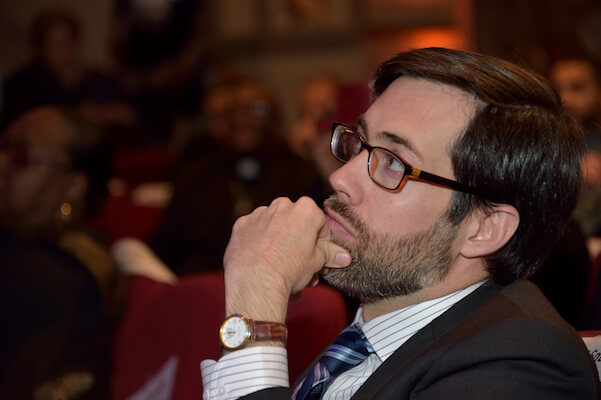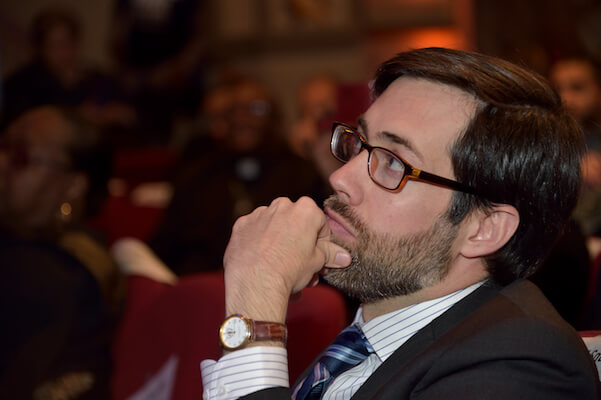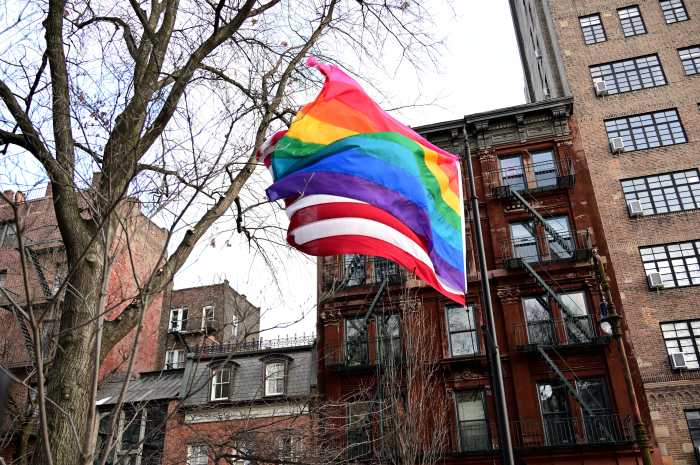State Senator Daniel Squadron, the lead GENDA sponsor. | DONNA ACETO
In a move likely to end chances for enacting the long-stalled Gender Expression Non-Discrimination Act during this session of the Legislature, the State Senate’s Investigations and Government Operations Committee has voted against sending the measure on to the full body for a vote.
The 6-3 vote on April 25 on the transgender civil rights measure saw three Democrats in the minority, with all five Republicans joined by Bronx Democrat Ruben Diaz, Sr., an implacable foe of LGBTQ rights, voting to defeat GENDA.
This week’s vote — which came about only because GENDA’s lead sponsor, Democrat Daniel Squadron, who represents Lower Manhattan and portions of Brooklyn, filed a motion forcing it — was only the second time a Senate committee has even taken up the measure, first proposed 14 years ago and approved 10 times by the Democratic-led Assembly. In 2010, the Judiciary Committee also blocked floor consideration, with Republicans and Diaz united in opposition.
Joined by Ruben Diaz, Sr., Republicans once again turn back transgender rights bill
“Today, the Senate stood with Trumpian divisiveness, discrimination, and fear,” Squadron said in a written statement. “As the Trump administration rolls back basic protections for transgender Americans, the Senate Majority has an obligation to ensure all New Yorkers are protected. Today, not one Republican senator voted to support basic fairness for all.”
Senator Brad Hoylman, Squadron’s out gay Manhattan Democratic colleague who was one of the other two “yes” votes on the committee, said, “It’s morally reprehensible that the State Senate considers transgender New Yorkers to be second-class citizens.”
Juli Grey-Owens, a Long Island transgender activist who headed up this year’s push in Albany dubbed GENDA 2017, said, “We thank those members of the Investigations and Government Operations Committee who voted in the affirmative to begin the process of passing legislation that would protect transgender New Yorkers with explicit anti-discrimination protections in our human rights and penal laws. While the Executive Branch of our federal government is politically motivated to target the marginalized and at-risk transgender community, it is a crushing blow to realize that the majority of our state senators believe that all New Yorkers are not equal.”
Other groups involved in the lobbying for GENDA included Equality New York, a group that emerged in the wake of the Empire State Pride Agenda’s collapse several years ago, the New York Civil Liberties Union, and Housing Works.
Terri Cook, the parent of a transgender child who lives near Syracuse and wrote “Allies & Angels: A Memoir of Our Family’s Transition,” said, “The voices speaking the loudest in opposition to GENDA are the ones with the least experience understanding it. The committee members who voted against GENDA neglected their obligation, as senators, to gain a deep understanding of this critical legislation and how it impacts New Yorkers.”
Many of the protections GENDA would provide were established by executive action from Governor Andrew Cuomo in 2015 in the face of intractable Senate Republican opposition, but President Donald Trump’s reversal of protections afforded to transgender students by the former Obama administration has heightened the urgency advocates feel in codifying the progress here in New York.
While acknowledging that the issue is now dormant for the session that runs through June, Squadron insisted, “A very bad vote is very different from defeat for the issue… Yesterday was very disappointing, very discouraging, and very disturbing, but it’s a step forward in identifying what we need to do to get this bill enacted.”
Though Squadron was unwilling to draw a specific analogy, many of those involved in the 2011 victory for marriage equality felt that the unsuccessful December 2009 vote, where the issue went down 38-24, laid the groundwork for primary and general election activism by the community that led to a 33-29 victory 18 months later.
Asked about Hoylman’s repeated argument that Senate Republicans have been unwilling to entertain any LGBTQ rights issues since the marriage win, Squadron said, “Yesterday was a strong piece of evidence toward that conclusion. One clear lesson is that with a Democratic-controlled Senate, [passage] is a lot more likely.”
With four of the five Republican “no” votes coming from senators representing either New York City, Nassau County, or the Hudson Valley — including Staten Island’s Andrew Lanza, long thought to be “gettable” — Squadron acknowledged, “It really does say something when even moderate Republicans vote ‘no.’”
Still, he noted that there are several dozen other Republicans in the Senate, some of whom also represent localities with transgender rights protections. Keeping his eye on the road ahead, Squadron said, “We know a lot more today than we did two days ago. We can see what we need to do. Look, we’re going to continue to push, continue to focus on this.”




































